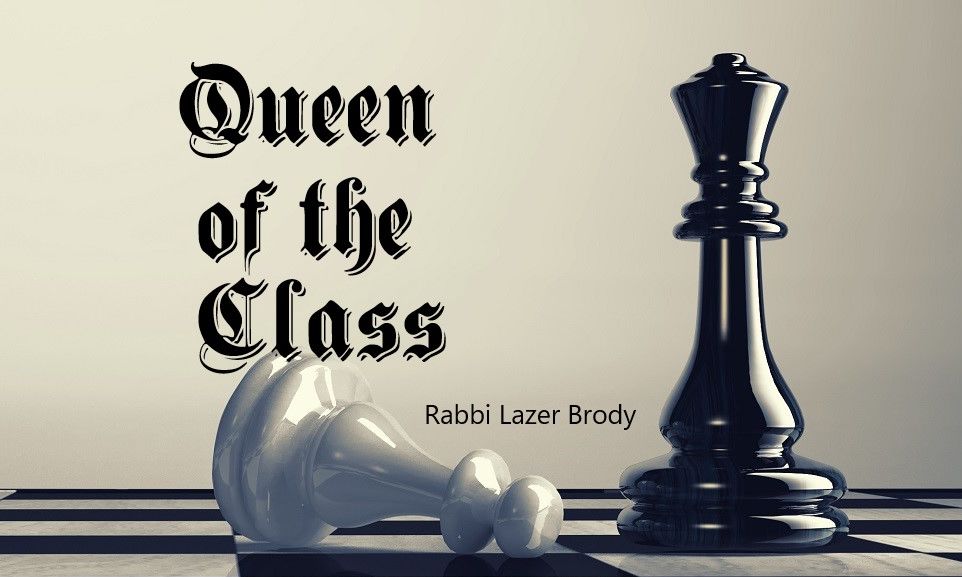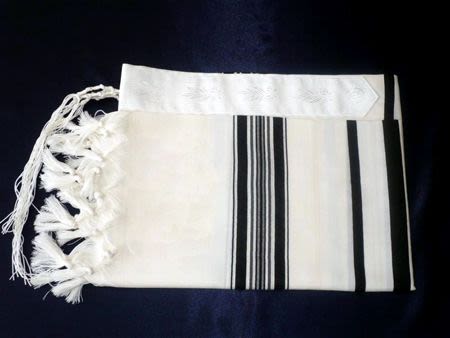
Queen of the Class?
Seeking a person's forgiveness is a lot more complex than seeking Hashem's forgiveness. This true story brought tears to my eyes...

Jewish Law tells us that Yom Kippur does not atone for the sins between man and fellow man. We can’t ask Hashem to forgive us for causing pain to another human being until we first seek that person’s forgiveness.
Seeking a person’s forgiveness is a lot more complex than seeking Hashem’s forgiveness. In that vein, I want to share with you a story that brought tears to my eyes when Rav Shalom Arush told it to me.
In Israel, there’s a concept among schoolgirls called Malkat HaKita, the queen of the class. Oftentimes, this is a blue-blooded and snobby girl, the daughter of a rich person or someone influential in the community, who loves to make fun at the expense of others. Rina, one such girl in a Beis Yaakov girls’ seminary (equivalent to High School) in Bnai Brak, was the 17-year-old queen of her 12th-grade class.
Once, one of the girls, Zeldie – not so pretty, not so popular, the frizzy-haired daughter of a cab driver – came to class with a short mushroom-style haircut. The queen was always on the prowl for a good laugh at someone else’s expense, so she yelled out, “Did it rain in the classroom recently? Our classroom is growing mushrooms!” At Rina’s cue, all the girls broke out laughing.
Zeldie could feel how her face flushed, that the blood left her face and she turned from crimson to white, as if someone had slit her throat. She suffered unbearable indescribable humiliation. She almost fainted. The bell rang, and the teacher called all the girls to settle down. Our victim sat in a puddle of tears, which could just as well have been a puddle of her own blood.
The queen of the class was an artist in what she called “the hairline laugh”, which in Hebrew means laughing at the expense of another person. This is the worst form of cruelty and cynicism – in my opinion, even worse than a terrorist.
Zeldie not only couldn’t concentrate in class, but she lost any semblance of self-esteem and self-confidence. The sorrow and the feelings of revenge were like acid in her heart. Nothing succeeded. Later that year, they graduated from Seminar, and she couldn’t find work. One by one, her classmates were getting engaged, and our victim wasn’t even getting any shidduchim (marital) proposals. Nothing was going right. She became a miserable, bitter, nervous bag of sorrow and revenge.
Ten years passed and Zeldie was now a 27-year-old wallflower still living at home with her mother.
Meanwhile, the queen of the class received a prestigious shidduch with a wealthy and prestigious family in Boro Park. After her wedding in Israel, she moved to America with her new husband. She had plenty of money, a big house, but ten years later, she still lacked life’s main joy – children. All her girlfriends were having their fourth and fifth children, but she still had none.
In Rina’s neighborhood, there lived another classmate – Sarki – from her old Beis Yaacov class in Bnai Brak. Sarki also married a Boro Park young man and moved to the USA after her wedding. In fact, Rina’s husband and Sarki’s husband learned at the same Kollel. The queen of the class used to beg her old classmate to come up for coffee or to talk, but Sarki always had a good excuse – she now two little tikes at her side, another two in a twin stroller, and she was well on the way with #5. Nevertheless, the queen of the class cornered her and coerced her – kids and all – to come to her 15th-Avenue home for coffee. She asked, “Why do you avoid me? Why does everyone seem to avoid me? My life is so miserable, and I do not understand why.”
Sarki blushed and did not want to talk. Rina, the former queen of the class, prodded her. Sarki cleared her throat with a forced cough and blurted, “OK, Rina, if you really want to know, I will never forget your cruelty. I do not know what to compare you to – a murderer? A heartless Nazi? Do you realize how you destroyed Zeldie’s life (the girl with the frizzy hair)?” Sarki had been periodically in contact with Zeldie and would call her from time to time.
The queen of the class begged Sarki for Zeldie’s phone number – she knew in her heart that the young mother was speaking the absolute truth, so she decided to call the victim and ask for forgiveness.
The queen of the class phoned the victim and begged for forgiveness. Zeldie screamed at her, “What do you mean? You embarrassed me in public, caused me torture and grief, and now you want to dismiss 10 years of suffering and loneliness with a wave of your hand, because you’re the queen of the class? Not anymore! Get out of my life! It’s not enough that you haunted me all these years and robbed me of any happiness or feeling of self-worth?” The victim slammed the phone down.
A week later, someone knocked on the victim’s door. Rina, eyes red with tears, begged Zeldie’s mother to let her in their modest flat in Shikkun Hey of Bnai Brak. Zeldie at first refused to speak to Rina. But with her mother’s prodding, Zeldie came to the door. The 27-year-old childless woman with puffy eyes and modest dress was not the arrogant and ultra-snobby queen of the class that she remembered. The two women instantaneously felt each other’s sorrow and fell into each other’s arms in a long cry and embrace. Their bodies heaved with sobs, a catharsis of years of pent-up emotions, sorrow and frustration. Each told the other her story of what they had been through for the last ten years. Finally, they forgave each other.
The queen of the class soon became pregnant, and the victim soon became a bride.
Later, the Rina realized that she had suffered double torture – first from humiliation, but even worse, from 10 years of burning hatred and revenge in her heart, that like acid, seemed to corrode the walls of her soul.
Let’s ask ourselves a question: In the story of the queen of the class, we see that the victim was also punished. Why? What did the victim do wrong? There are two reasons, as Rav Shalom explained to me: If someone suffers because of you, then you suffer too. That’s why we pray at Kriat Shma every night, that no one should be punished because of me.
Let’s be extra careful in not hurting a single human on earth. But if someone hurts us, we must accept it with emuna – as painful as it is – believe that everything Hashem does is perfect justice. Let’s blame our misfortune on our uncorrected transgressions.
When we forgive others, Hashem forgives us of our transgressions, measure for measure. But when a person demands justice, Hashem checks who is demanding judgment, and opens that person’s file.
On Yom Kippur, we want to atone for our sins and not have our files reopened. Let’s not throw the book at someone else, so that we do not get the book thrown at us! That is why we also say at night, “Sharei lei leman demetzar li…” – I forgive whoever gave me grief. May we all receive a final inscription in the Book of Long Life for a wonderful New Year, amen!










